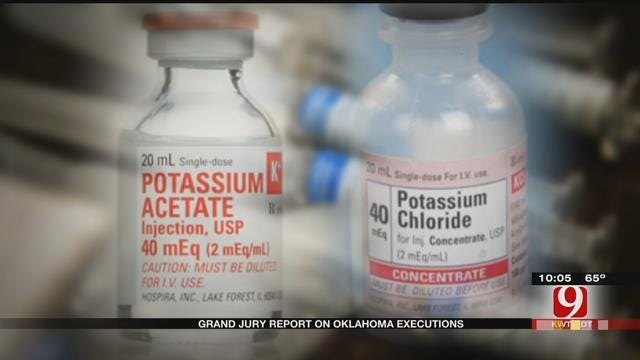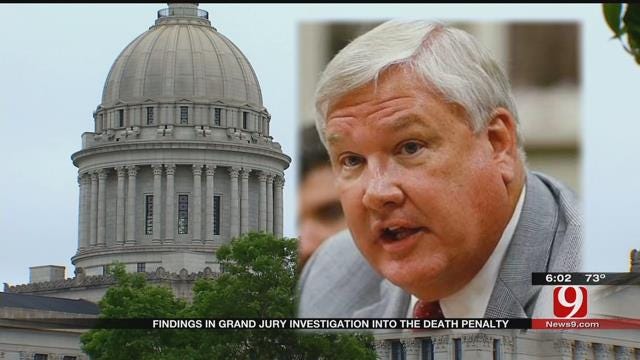Scathing Report Shows Problems, Negligence In OK Executions
<p>The calls started around 12:30 p.m. on Sept. 30, 2015, three hours before convicted murderer Richard Glossip's third scheduled execution. </p>Friday, May 20th 2016, 8:02 pm
The calls started around 12:30 p.m. on Sept. 30, 2015, three hours before convicted murderer Richard Glossip's third scheduled execution. The Oklahoma Department of Corrections was newly aware it had received the drug Potassium Acetate instead of Potassium Chloride. Potassium Chloride is the correct and final deadly drug of the lethal injection compound according to state protocol.
According to a Multicounty Grand Jury report issued Thursday, several meetings were held at Attorney General Scott Pruitt's office who ultimately decided the execution should be stayed. But not everyone was convinced.
Both the lead member of the execution team and the pharmacist said the drugs were medically interchangeable and the execution should move forward. That's when the governor's then general counsel Steve Mullins stepped in.
According to his own testimony, Mullins repeatedly pushed the governor to proceed with the execution. At one point he told a staffer the drugs were medically the same and she should "Google it" to find out.
Mullins then told Pruitt the wrong drug had been used in the execution of Charles Warner, a fact that was hidden from the public. He also told the governor to avoid using the phrase "wrong drug" because it would "require having to inform people the wrong drug had been used in Warner's execution" hoping to avoid litigation over the mix up.
Mullins resigned in February, four months after testifying to the Grand Jury.
Twenty minutes after Glossip’s scheduled execution at 3:30pm; he was still alive and strapped the execution table. Mrs. Fallin issued a stay in his case all executions in the state were halted by Pruitt soon after.
PROBLEMS AND NEGLIGENCE
Harsh words were used to describe how the wrong drug was delivered to the Oklahoma State Penitentiary on September 30, 2015. The state’s 34 page protocol requires potassium chloride as the final deadly drug in lethal injection in combination with midazolam and rocuronium bromide. What the state received was potassium acetate.
Problems began right away. After much trouble and a refusal to supply from one pharmacist, the state gave their order to a willing pharmacist "by phone" never submitting a formal request or giving the pharmacist a copy of the state's execution protocol until after the execution, according to the grand jury report.
According to testimony from the Pharmacist, he used a wholesale website to fill the verbal order. He told the Grand Jury the site didn't specify different kinds of potassium but said "in my pharmacy brain, the potassiums (sic) are interchangeable" and later added it was "pharmacy brain versus probably law brain, I guess, I don't know." However, later the report says records did not support his claims about the website.
The troubles didn't stop there. When the drugs were delivered the report outlines a process "devoid of detailed attention necessary" within the prison ultimately stopping with the Warden, who is unnamed in the report. He told jurors he noticed some of the vials said potassium acetate and "did not tell anybody" saying he "assumed" they were the same drug.
He told the jury there were "lots of things that took place that wasn't (sic) in the policy" and "there are just some things you ask questions about, and there's some things that you don't. I never asked questions about the process." He eventually placed the blame on the Director and the IV team leader the only witness who expressed remorse in the 106 page report.
“The buck stops with me,” the team leader told the grand jury when asked how the team did not notice the vials were labeled as two separate drugs. “I should have noticed it. I didn’t notice it… And I feel terrible for that – if anyone else is… taking any heat for that, because it was my job.”
He added he would accept the “full weight of responsibility” for what occurred.
REACTIONS POUR IN
After the report outlined a series of what it called incompetent and at times negligent behavior, top members of the government began responding.
New DOC director Joe Allbaugh asked for patience saying in part in a statement on Thursday, "After reviewing the grand jury's recommendations, we will determine if additional changes need to be made." He has said in the past DOC is equipped and ready to begin executions again once the moratorium is lifted.
Mrs. Fallin asked for time to analyze the report but added in a statement on Thursday "It is imperative that Oklahoma be able to manage the execution process properly."
Pruitt attached a full page statement to the official report which read in part "when the state fails to do its job in carrying out an execution, the ability to dispense justice is impaired for all. This must never happen again."
But those against the death penalty rallied today and said the findings in the report supported their cause to stop all executions permanently.
The Oklahoma Coalition to Abolish the Death Penalty held an hour- long press conference Friday inside the state Capitol. The coalition is made up of various religious and civil groups along with former and current legislators.
“This causes embarrassment to us in the state. I don't think it's an accident that people both within Oklahoma and without look at us with a mixture of pity, frustration, anger, confusion or outright laughter,” ACLU-Oklahoma legal director Brady Henderson said.
THE NEXT STEP?
The Grand Jury recommended in the report the state should retain experts on an alternative to lethal injections, namely nitrogen hypoxia.
Jurors heard from one unnamed doctor and an unnamed professor who testified the method would be cost effective during a global shortage of drugs normally used in the lethal injection compound. One expert called the method “quick and seemingly painless.”
The hypoxia method was signed into law by Mrs. Fallin as a backup method should lethal injection be deemed unconstitutional. According to a release from Fallin in Apr. of 2015, the inmates would be put to death by using a device similar to those used by anesthesiologists on patients. Inmates would breathe in nitrogen, replacing the oxygen in their blood until they died. Oklahoma would be the first state to use the method if protocol is changed to include it.
The Grand Jury will meet again June 14. According to a spokesperson for the Attorney General Lincoln Ferguson, the juror could hand up indictments if jurors see fit, however he added that would be unlikely due to the abundance of evidence they were given.
After the final meeting, there is expected to be another 150 day moratorium on executions to allow for any changes to state protocol.
More Like This
May 20th, 2016
March 22nd, 2024
March 14th, 2024
February 9th, 2024
Top Headlines
April 25th, 2024
April 25th, 2024
April 25th, 2024












